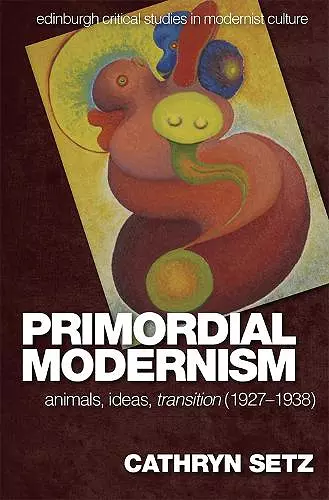Primordial Modernism
Animals, Ideas, transition (1927-1938)
Format:Paperback
Publisher:Edinburgh University Press
Published:26th May '21
Currently unavailable, and unfortunately no date known when it will be back

Brings ideas and animals together to shed new light on modernist magazine culture Tests the concept of ‘primordial’ modernism as a tributary of primitivism, Jungian thought, and fraught nationalismsProvides readings of Eugene Jolas’s creative and critical works that place him centre-stage in modernist studiesMoves between unpublished archival material, reception studies, and readings of overlooked authorsConsiders a wide range of modernist authors and artists as befitting to such a rich documentTouches on contemporary scientific discourse as an aspect of animal studies This adventurous study focuses on experimental animal writing in the major interwar journal transition (1927–1938), which contains a striking recurrence of metaphors around the most basic forms of life. Amoebas, fish, lizards, birds – some of the ‘lowest’ and ‘oldest’ creatures on earth often emerge at the very places authors seek expressions for the ‘newest’ and the ‘highest’ in art. Discussing works by James Joyce, Henry Miller, Gottfried Benn, Eugene Jolas, Kay Boyle, Bryher, Paul Éluard and more, Cathryn Setz investigates this paradox and provides a new understanding of transition’s contribution to twentieth-century periodical culture.
Cathryn Setz is the first scholar who dares systematically study a key modernist magazine (the famous transition) via its fantastic zoology. Animals like amoebas, lizards, fish, and birds function as uncanny attractors bringing out problematics of raw life and pre-verbal expression, Ur-myths of nonhuman forms of social life. In this brilliant and captivating book, Setz offers us a new Origin of Species of transatlantic modernism. * Jean-Michel Rabaté, University of Pennsylvania, American Academy of Arts and Sciences *
Primordial Modernism asks us to behold modernism afresh, through pineal eyes. Gone is the fetishization of male ego that once made Wyndham Lewis’s coinage, “the Men of 1914”, a reasonable characterization of the modernist movement. Gone, too, is the fetishizationof genius. Jolas is celebrated by Setz primarily for his influence on other writers, while the most august of the magazine’s contributors, James Joyce, is shrunk; Setz puts it beautifully: “The ‘Work in Progress’ was an agenda-setting presence [for transition], and the slither of that world of a book explored here has received a necessarily partial discussion”. -- Beci Carver * Times Literary Supplement *
ISBN: 9781474484251
Dimensions: unknown
Weight: 345g
224 pages